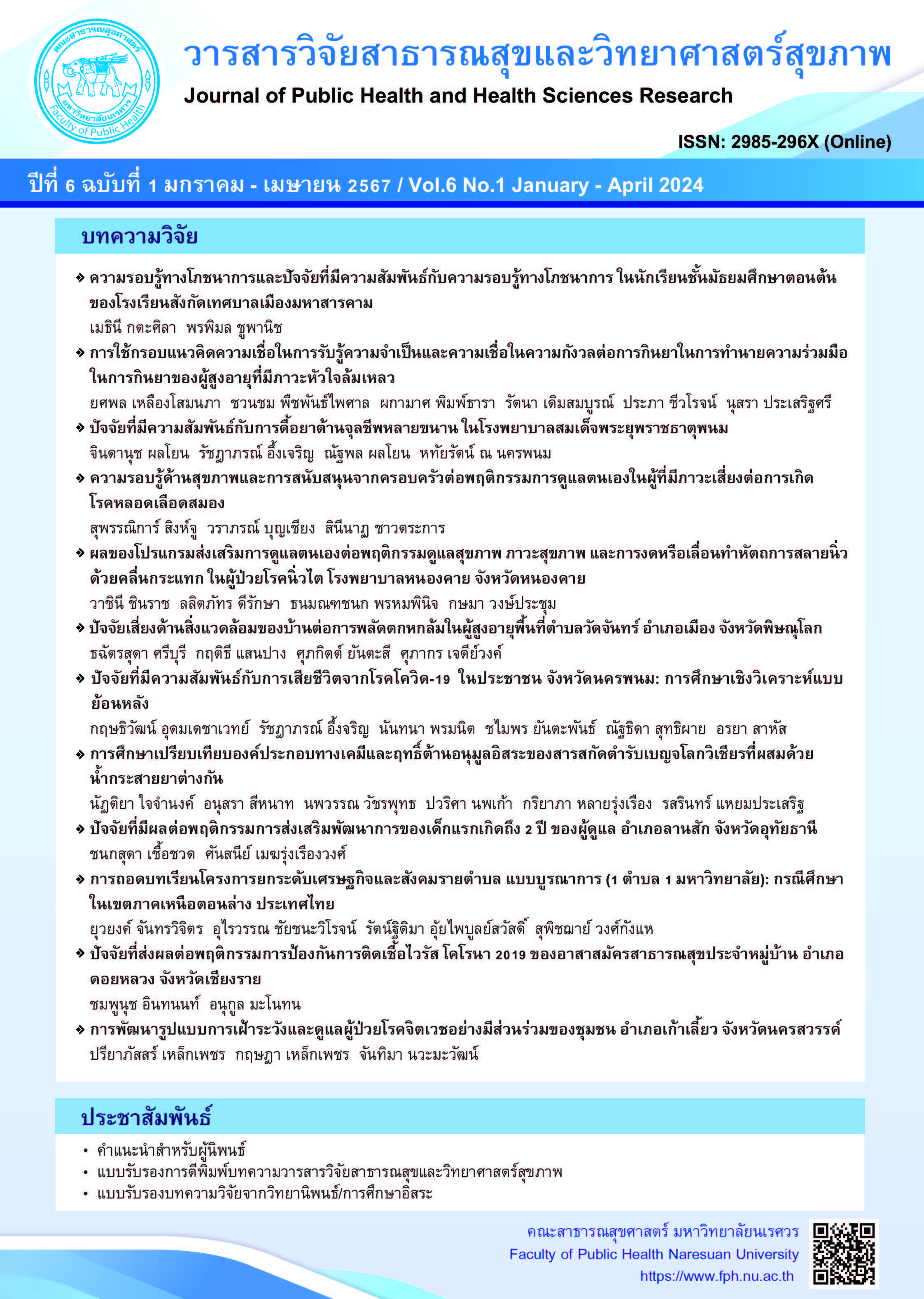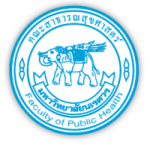ปัจจัยที่มีผลต่อพฤติกรรมการส่งเสริมพัฒนาการของเด็กแรกเกิดถึง 2 ปี ของผู้ดูแล อำเภอลานสัก จังหวัดอุทัยธานี
คำสำคัญ:
พฤติกรรมการส่งเสริมพัฒนาการ, เด็กแรกเกิดถึง 2 ปี, ผู้ดูแลเด็กบทคัดย่อ
การวิจัยเชิงพรรณนาแบบภาคตัดขวางนี้ มีวัตถุประสงค์เพื่อประเมินพฤติกรรมการส่งเสริมพัฒนาการของเด็กแรกเกิดถึง 2 ปี และศึกษาปัจจัยที่มีผลต่อพฤติกรรมการส่งเสริมพัฒนาการเด็กของแรกเกิดถึง 2 ปีของผู้ดูแล อำเภอลานสัก จังหวัดอุทัยธานี กลุม่ ตัวอยา่ งเปน็ ผูดู้แลเด็ก จำนวน 420 คน สุม่ ตัวอยา่ งแบบเปน็ ระบบเก็บข้อมูลโดยใช้แบบสอบถาม ที่ผ่านการหาค่าความตรงเชิงเนื้อหาและความเที่ยง วิเคราะห์ข้อมูลโดยใช้สถิติเชิงพรรณนาและการวิเคราะห์ถดถอยพหุคูณแบบขั้นตอน ที่ระดับนัยสำคัญ 0.05
ผลการศึกษา พบว่า กลุ่มตัวอย่างมีพฤติกรรมการส่งเสริมพัฒนาการเด็กแรกเกิดถึง 2 ปี ในระดับสูง (Mean = 2.43, S.D. = 0.50) และพบว่าปัจจัยที่สามารถทำนายพฤติกรรมการส่งเสริมพัฒนาการเด็กแรกเกิดถึง 2 ปี ได้แก่ เวลาในการเล่นกับเด็ก ความรู้เกี่ยวกับการส่งเสริมพัฒนาการเด็ก การศึกษามัธยมศึกษาตอนต้นหรือสูงกว่าของผู้ดูแล การรับรู้ประโยชน์ในการส่งเสริมพัฒนาการเด็ก สถานภาพสมรสคู่ การเข้าถึงแหล่งบริการสาธารณสุขและจำนวนปีในการมีประสบการณ์เลี้ยงดูเด็ก ซึ่งสามารถร่วมทำนายพฤติกรรมการส่งเสริมพัฒนาการเด็กแรกเกิด ถึง 2 ปีของผู้ดูแล ได้ร้อยละ 13.2 (R2 = 0.148) การศึกษานี้มีข้อเสนอแนะ คือ หน่วยงานที่เกี่ยวข้อง ทั้งภาคส่วนสาธารณสุขและหน่วยงานต่างๆ ควรมีการอบรมเพื่อให้เกิดความรู้เกี่ยวกับการส่งเสริมพัฒนาการเด็ก ออกแบบกิจกรรมที่ส่งเสริมการรับรู้ประโยชน์ในการส่งเสริมพัฒนาการเด็ก และส่งเสริมการใช้เวลาในการเล่นกับเด็ก โดยเฉพาะในกลุ่มที่มีการศึกษามัธยมศึกษาตอนต้นหรือสูงกว่า รวมทั้งออกแบบการจัดบริการให้เข้าถึงแหล่งบริการสาธารณสุขเกี่ยวกับส่งเสริมพัฒนาการเด็ก เพื่อส่งเสริมให้ผู้ดูแลมีพฤติกรรมการส่งเสริมพัฒนาการเด็กแรกเกิดถึง 2 ปี ที่เหมาะสม
References
Best, J. W. (1977). Research in education. (3rd ed.). Engle Clift, NJ: Prentice-Hall.
Bloom, B. S. (1975). Taxonomy of education. New York: Avid McKay Company.
Busarathid, K., Prasomsuk, S., & Busarathid, J. (2021). Role of nurses in Sub-District Health Promotion Hospital for early childhood development promotion. Christian University Journal, 27(2), 120-131. (in Thai)
Chaikongkiat, P. (2018). Factors related to suspected delayed development of early childhood. Princess of Naradhiwas University Journal of Humanities and Social Sciences, 5(2), 161-171. (in Thai)
Chinpitakwattana, K., & Kulapichitr, U. (2015). Need assessment of caregivers’ educaringinfants and toddlers in childcare center. An Online Journal of Education, 10(1), 30-43. (in Thai)
Department of Health. (2017). Annual report 2017. Bangkok: National Institute of Child Health Development. (in Thai)
Department of Health. (2018). Guidelines for driving the first 1,000 days of life. Bangkok: Bureau of Nutrition, Department of Health, Ministry of Public Health. (in Thai)
Gladstone, M., Phuka, J., Mirdamadi, S., Chidzalo, K., Chitimbe, F., Koenraads et al. (2018). The care, stimulation and nutrition of children from 0-2 in Malawi—Perspectives from caregivers;” Who’s holding the baby?”. PLoS One, 13(6), e0199757.
Hair, J. J. F., Black, W. C., Babin, B. J., Anderson, R. E., & Tatham, R. L. (2006). Multivariate data analysis. (6th ed.). Upper Saddle River, NJ: Pearson Education.
Kue-iad, N., Chaimay, B., & Woradet, S. (2018). Early childhood development among Thai children aged under 5 years: A literature review. The Southern College Network Journal of Nursing and Public Health, 5(1), 281-296. (in Thai)
Ministry of Public Health. (2017). Maternal and child health standards reporting group. Social Risk Screening Results. Child Development. Retrieved on May 5, 2019, from https://hdcservice.moph.go.th/hdc.
Ministry of Public Health. (2019).Development assessment for intervention manual (DAIM). Bangkok: Office of the war veterans organization of Thailand.
Mindell, J., & Owens, J. (2009). A clinical guide to pediatric sleep: Diagnosis and management of sleep problems.(3rd ed.). Philadelphia: Wolters Kluwer.
National Institute of Child Health. (2018). Parenting guidelines promote development and learning of children under 3 years old. Nonthaburi; C G TOOLS. (in Thai)
Pender, N.J., Murdaugh, C. L., & Parsons, M. A. (2011). Health promotion in nursing practice.(6th ed.). New Jersey: Prentice-Hall.
Pitipat, A., Bhokkhaphabhubeth, S., Khamsripon, C., & Reungworaboon, S. (2018). Factors related to behaviors promoting toddler’s growth and development of toddler caregivers. Journal of Boromarajonani College of Nursing, Bangkok, 34(3), 1-10. (inThai)
Poramat, K., Intaraprasong, P., Sattayasomboon, Y., & Silabutr, J. (2017). Factors related to the effectiveness of developmental surveillance and promotion of children from birth to 5 years in a Tambon Health Promoting Hospital of Public Health Service Provider Region 5. Journal of Public Health, 47(3), 301-314. (in Thai)
Russell, C. G., Haszard, J. J., Taylor, R. W., Heath, A. L. M., Taylor, B., & Campbell, K. J. (2018). Parental feeding practices associated with children’s eating and weight: What are parents of toddlers and preschool children doing?. Appetite, 128, 120-128.
Saengkaew, R., Poogpan, J., Kamenkan, K., & Maspromrat, W. (2021). Factors predicting behaviors of caregivers in promoting early childhood development. Thai Red Cross Nursing Journal, 14(2), 152-164. (in Thai)
Saengprom, N., & Chinsomphon, S. (2015). Factors affecting the child-bearing behavior of mothers in received the services at Pediatric Department of Fort Suranari Hospital in Nakron Ratchasima Province. National Academic Conference and Research Presentation create and develop to progress towards the 2nd ASEAN Community. (page 52-58). Nakron Ratchasima: Nakhon Ratchasima College. (in Thai)
Sukkumnerd, S. (2018). Research and development of surveillance and promotion child development system by community participation. Primary Health Care Division Journal, 12(4),16-27. (in Thai)
Thawitha, L., Klunklin, P., & Urharmnuay, M. (2016). Preterm infant development promoting behaviors among primary caregivers and related factors. Nursing Journal, 43(4), 12-22. (in Thai)
Thisara, P., Ponmark, J., Seekhao, P., & Sinlapawitthayathon, B. (2017). Predictive factors of parental behaviors on promoting early childhood development in Phayao Province. Journal of Nursing and Health Care, 35(2), 169-176. (in Thai)
Tipmanosing, D. (2022). Factors affecting early childhood development of children at the Bangkok Child Development Centers. Journal of Charoenkrung Pracharak Hospital, 18(1), 51-68. (in Thai)
UNICEF of Thailand. (2016). The main mission of UNICEF. Early childhood development. Retrieved Dec 4, 2018. from https://www.unicef.org/thailand/thMinistry of Public Health.
Vanichbuncha, K., & Vanichbuncha, T. (2015). Using SPSS for Windows for data analysis. (27th ed.). Bangkok: Samlada. (in Thai)
Waedlom, W.,Chaimongkol, N., & Teerarungsikul, N. (2010). Influencing of spouse support and family functioning on sensitivity of adolescent mothers’ response to infant cues. Journal of Nursing and Education, 3(2), 44-56. (in Thai)
Downloads
เผยแพร่แล้ว
How to Cite
ฉบับ
บท
License
Copyright (c) 2024 วารสารวิจัยสาธารณสุขและวิทยาศาสตร์สุขภาพ

This work is licensed under a Creative Commons Attribution-NonCommercial-NoDerivatives 4.0 International License.
บทความที่ได้รับการตีพิมพ์เป็นลิขสิทธิ์ของวารสารวิจัยสาธารณสุขและวิทยาศาสตร์สุขภาพ
ข้อความที่ปรากฏในบทความแต่ละเรื่องบทความในวารสารวิชาการและวิจัยเล่มนี้เป็นความคิดเห็นส่วนตัวของผู้เขียนแต่ละท่านไม่เกี่ยวข้องกับมหาวิทยาลัยนเรศวร และคณาจารย์ท่านอื่นๆในมหาวิทยาลัยฯ ความรับผิดชอบเกี่ยวกับบทความแต่ละเรื่องผู้เขียนจะรับผิดชอบของตนเองแต่ละท่าน






